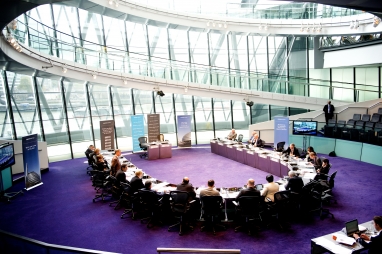
TfL projects safe from the axe - for now, says Commissioner
All of Transport for London's current programme of projects are safe from the axe, despite a £240m gaping hole in its 2016/17 finances, TfL's commissioner for transport Mike Brown told the London Assembly Budget & Performance Committee.
Transport Commissioner Mike Brown faced the Committee with TfL chief finance officer Ian Nunn and deputy mayor for transport Isabel Dedring. Questioned by the elected Assembly's Budget & Performance Committee (chaired by Labour member for City and East London John Biggs) Brown said no projects currently included in TfL's project programme would be cut.
"Our starting point is that all projects programmed prior to last year are safe. We are looking at doing the same list, but at less cost. Options available to us include value engineering with contractors engaged in projects, plus there are opportunities for back office cost savings across our project programme," Brown said.
A new London Mayor will be elected on 5 May this year. Isabel Dedring told the committee that a new TfL business plan detailing how the savings will be made will be published ahead of the election purdah period in March this year.
Whoever is elected the next London Mayor – Labour's Sadiq Khan and the Conservative candidate Zac Goldsmith are the bookies' favourites – will have a tough task balancing the books on transport. Chancellor George Osborne's 2015 autumn spending review cut the revenue grant portion of TfL's funding to zero from 2018/19 – effectively taking £2.8bn off its five year government funding settlement.
"Our starting point is that all projects programmed prior to last year are safe. We are looking at doing the same list, but at less cost." Mike Brown
The revised funding envelope leaves TfL £240m short of its previous budget for 2016/17. It must then find £471m of savings for 2017/18 and budget reductions of around £720m for each of the three subsequent years up to 2021.
"We have three levers we can use to meet the new funding profile," Ian Nunn told the Committee. "We can make savings on our operations, we can value engineer projects in flight and we can consider whether to defer or cancel projects. Number one is the best because we get the savings every year."
TfL's capital programme for 2016/17 amounts to £3.6bn, of which £1.3bn will be spent on Crossrail and a further £1.3bn will be invested in Tube line and stations upgrades. Around £150m is due to be spent on London's red route road network and £35m is earmarked for Cycle Superhighways.
These funding plans are effectively safe, Brown said, but after that "nothing can be ruled out", he told the Committee. That includes changes to transport fares in the capital. "It's highly unlikely that there can be fare freezes or reductions in future," Brown said.
The cycling infrastructure programme is still very important to TfL, he said, but he added: "We don't have all the answers (for meeting the budget) yet. We will work with whoever is elected as mayor to deliver as much of our plans as possible."
TfL has also got to account for £1bn lost through the failed Bombardier Tube upgrade contract, which is now five years overdue. Questioned by the committee on who was to blame for this, Isabel Dedring said: "It's not so much about blame, but how we can learn from it and avoid the same in future."
The deputy chair of the Committee Stephen Knight told Infrastructure Intelligence: "We have more questions to ask TfL about this. Performance monitoring reports didn't show the project going into the red. It all just suddenly went blank. The financial reporting was abysmal. Even for TfL, £1bn is not chicken feed and will have an impact, which we've not seen yet. TfL has also told us some of the loss of revenue budget will come from its capital funds so this is being squeezed at both ends."